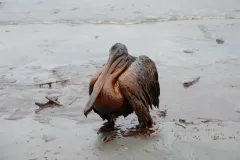Animals and the Oil Spill: What Can You Do?

Lately we’ve been fielding questions from Smithsonian visitors wondering how they can help with the oil spill cleanup in the Gulf of Mexico. If there is any good news coming out of this situation, it’s that thousands of people across the U.S. care deeply and are finding ways to respond to the oil spill.
Some people are donating or volunteering. Some are making changes in their homes and workplaces—reducing their energy consumption and ditching the disposable lifestyle. Some are expressing their views through the media and to their elected officials. These and other actions are all part of what we call “Finding Your Blue.”
But let’s face it: For many of us, the images of oiled wildlife take this to another level. Probably the number one question we’ve received from Smithsonian visitors (as well as friends and family) is how can I support animal rescue? Can I help clean oiled birds, and should I send money? While we can’t tell you exactly what to do, we do have some information that might help you navigate your way toward the answers:
First, new volunteer opportunities working with wildlife from the oil spill do not appear to be available, and only trained personnel are conducting rescues and rehabilitation. Tri-State Bird Rescue & Research is a Delaware-based non-profit organization that is under contract with BP to lead animal rescue efforts, and BP is responsible for covering the costs.
Tri-State, in turn, is working with the California-based International Bird Rescue Research Center (IBRRC) and U.S. Fish and Wildlife to manage the rehabilitation of oiled pelicans and other wildlife. Several other organizations within and beyond the gulf region are part of this effort as well. For example, veterinary staff from the New England Aquarium (an Ocean Portal collaborator) and other zoos and aquaria have been dispatched to assist with Gulf turtle rescue at the Audubon Aquarium of the Americas in New Orleans.
Even with BP picking up the tab, support is still needed for rehab efforts and there are many ways to help. Jay Holcomb, IBRRC Executive Director, writes in his June 4 blog post from Louisiana: “For those of you who are asking about ways that you can either support us or donate to us, I thank you for your generosity … [Y]our local wildlife rehabilitation organization really needs your help also. …A pelican is a pelican whether is it tangled in fishing tackle or oiled! Please send support to your local wildlife rehabilitation organizations.”
Perhaps you want to volunteer along the Gulf coast, even if you can’t rescue animals. You have several options. One is to call the official volunteer hotline at 1-866-448-5816, which is run by BP. Volunteers are needed to help "preclean" beaches — by picking up trash and other debris so that oil cleanup will be more effective. Volunteers are also needed to help maintain cleanup equipment and inventories and perform administrative work. To date, BP reports that 17,468 people have applied to volunteer, and 6,003 are in training or have been trained. Alternatively, you could volunteer through one of the state-run programs in Louisiana, Mississippi, Alabama, or Florida.
A third option is to connect with conservation groups at the local level. On June 5, for example, the Ocean Conservancy (an Ocean Portal collaborator) teamed up with several other organizations for a St. Petersburg, Florida cleanup. Marine debris is a major hazard to marine life, so oil or no oil, removing it benefits all wildlife in the area.
Getting involved is an effective antidote to the discouraging sight of oil spewing from the leaking pipe on the ocean floor. The oil spill cleanup and restoration will be a long-term effort, and help will be needed on an ongoing basis. Wherever you live, there is something you can do to help the ocean—such as keeping your local waterways and beaches free of trash and reducing your energy use. These are just a few ideas—what are yours? If you haven’t quite yet figured out how best to help, don’t give up! Just take another look at the pictures of the animals mired in oil, and then do something.
Editor’s Note: Ocean Portal intern Nicholas Platt contributed to this post.

